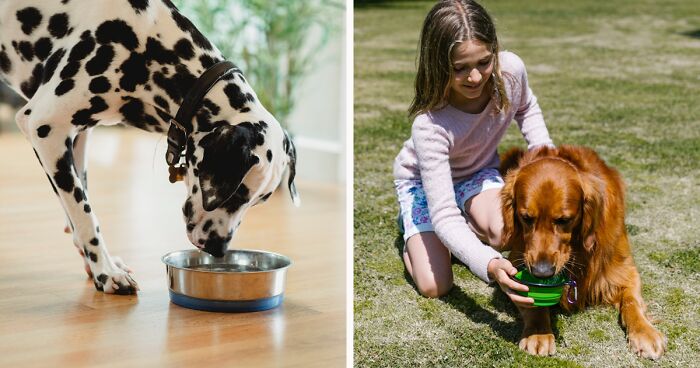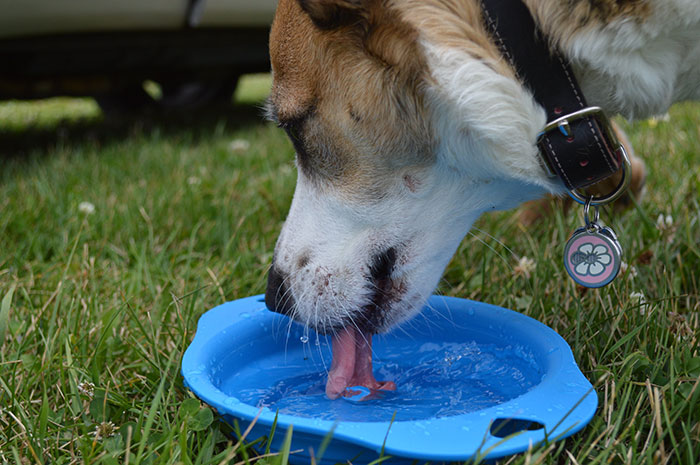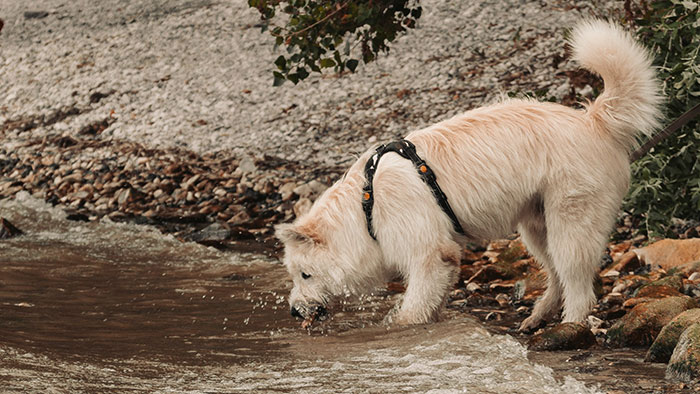Our furry friends bring so much joy into our lives with their wagging tails and enthusiastic personalities. As responsible dog owners, ensuring our canine companions stay hydrated is crucial for their well-being. While water should always be the go-to choice, there are other options for dog drinks besides water to keep their hydration game strong.
- Homemade electrolyte solution is safe for dehydrated dogs.
- Fruit juices can lead to weight gain, avoid grapes/raisins.
- Soda is risky for dogs due to sugar and caffeine content.
- Alcohol is poisonous to dogs, can cause serious harm.
- Coconut water and specific dog-friendly drinks can be safe.
Let’s explore what dogs can drink besides fresh water and dive into some questions you might have about their beverage choices and dog health in general. Keep reading to learn more about what is good for dogs!
The information provided herein is for informational purposes only. Please refer to our disclaimer for more details..
- What Electrolytes Are Safe For Dogs?
- Can Dogs Drink Gatorade and Juice?
- Can Dogs Get Sick of Soda?
- What Happens When Dogs Drink Alcohol?
- Can Dogs Get Bored? Drinks Your Dog Can Enjoy Safely
- Ensuring Your Dog Stays Hydrated: A Few Tips for Hydration For Your Dog
- Can You Give Your Dog Too Much Water?
- In Conclusion: Tailoring Hydration for Your Pup
- Frequently Asked Questions: What Can Dogs Drink?
What Electrolytes Are Safe For Dogs?
Although most dogs regulate their electrolytes just fine, some dogs may benefit from a little electrolyte boost, especially after intense play or on hot days. While specialized electrolyte-enhanced drinks for dogs are available, you can also offer them a homemade electrolyte solution. Mix water with a pinch of salt and a teaspoon of sugar for a hydrating and natural electrolyte source for your dog to drink.
However, it’s crucial to avoid giving your dog electrolyte drinks designed for humans, as they may contain ingredients that are safe for us but toxic for our canine companions.
Can Dogs Drink Gatorade and Juice?
Image credit: Doug Brown
The image of a dog lapping up a bowl of fruit juice or Gatorade might seem adorable, but it raises some important considerations. Fruit juices can be high in sugars and calories, leading to weight gain and other health issues for your pup.
While small amounts of diluted, fresh fruit juice may be okay for some dogs, it’s crucial to be mindful of the sugar content. Additionally, some fruits, like grapes and raisins, are toxic to dogs, so steer clear of juices from these fruits.
Also, remember that many juices contain additives unsuitable for dogs. We recommend you always consult with your veterinarian before introducing new beverages to your dog’s diet.
Can Dogs Get Sick of Soda?
Imagine the fizzy excitement of soda bubbles dancing on your dog’s tongue. While the mental image may bring a smile, the reality is far from delightful. Soda, with its high sugar and caffeine content, is unsuitable for dogs. In fact, it can be downright dangerous.
The caffeine in soda can lead to increased heart rate, restlessness, and even toxicity in dogs. Furthermore, the high sugar content contributes to obesity and severe dental problems.
So, let’s keep the soda sips for ourselves and offer alternatives that are safe for dogs to drink.
What Happens When Dogs Drink Alcohol?
Image credit: Lisá Yakurím
While we might enjoy the occasional drink, it’s crucial to recognize that alcohol is poisonous to dogs. Dogs metabolize alcohol differently than humans, making even small amounts potentially toxic. Ingesting alcohol can lead to a range of harmful effects, including vomiting, diarrhoea, coordination problems, and respiratory issues. In more severe cases, when dogs drink alcohol, it can result in coma, seizures, and even death.
The ethanol in alcoholic beverages affects dogs and can cause issues with their central nervous system and lead to significant damage. What might seem like a harmless sip to us can have severe consequences for our furry friends. Symptoms of alcohol poisoning in dogs include lethargy, confusion, and an inability to stand or walk properly.
As responsible pet owners, it’s paramount to make sure your dog never has access to alcohol. Dogs rely on us to keep them safe, healthy and happy. If you suspect your dog has ingested any amount of alcohol, seek immediate veterinary attention.
Can Dogs Get Bored? Drinks Your Dog Can Enjoy Safely
- Coconut Water: Coconut water is safe and an excellent source of hydration for dogs. It’s low in calories, fat-free, and contains natural electrolytes, making it an excellent option for rehydrating your canine companion.
- Almond milk: While some dogs are lactose intolerant and should avoid regular cow’s milk, almond or cashew milk can be a suitable alternative. Ensure it’s unsweetened and free from any additives. However, it’s essential to note that not all dogs may enjoy the taste of nut milk and may not drink enough.
- Vegetable Juice: Dogs can occasionally enjoy freshly squeezed, dog-friendly vegetable juices as a healthy addition to your pup’s diet. Carrot or spinach juice, for example, provides vitamins and minerals without the excess sugars in fruit juices.
- Electrolyte-Enhanced Drink: Specific electrolyte drinks designed for dogs can help replenish essential minerals or help dogs suffering from illnesses after physical activity. Always choose products specifically formulated for canine consumption that are safe for your dog.
If you are worried whether something might be suitable for your dog, aside from water, to keep your dog hydrated, we recommend you contact your veterinary care provider.
Ensuring Your Dog Stays Hydrated: A Few Tips for Hydration For Your Dog
- Daily Water Intake: Dogs should drink one ounce of water for every pound of body weight (roughly 70 ml per kilo of body weight). Adjustments may be needed based on your dog’s activity level, health, and the climate you live in.
- Fresh Drinking Water: Always provide your dog with fresh drinking water. Regularly clean their water bowl to ensure cleanliness and freshness.
- Hydration for Active Dogs: Active dogs may require more water, especially after exercise or play. Keep an eye on their water intake to ensure they stay adequately hydrated.
Can You Give Your Dog Too Much Water?
Yes, dogs can drink too much water! It is, however, unlikely that you can force them to drink too much, so don’t worry about that.
Dogs need to drink to stay healthy and happy, but if your furry friend is suddenly drinking excessive amounts of water all the time, it may be a sign of a disease like diabetes or other similar issues. If you are worried, you should contact your veterinary care provider.
In Conclusion: Tailoring Hydration for Your Pup
In the grand scheme of things, regular water is the best and safest option for your dog. For most, it is not necessary to offer your dog anything in place of water to keep them happy. It is not common that dogs get bored the same way we do.
However, offering them occasional alternatives can add a touch of excitement to their daily routine. Whether it’s a splash of coconut water after a long walk or a sip of diluted vegetable juice, the key is moderation and a watchful eye on their overall diet.
Remember, while dogs can enjoy a variety of drinks, some human beverages are highly toxic to dogs. Never let your dog drink or eat alcoholic beverages or items.
So, here’s to happy, hydrated dogs enjoying the delightful array of safe and tasty drinks we offer them, tail wags and all!
Frequently Asked Questions: What Can Dogs Drink?
Did we miss something? Take a look at our FAQ and see if your question pops up here!
Q1: Can dogs drink milk?
While some dogs can tolerate small amounts of milk, many adult dogs are lactose intolerant. It’s advisable to avoid regular cow’s milk. If you want to offer a milk-like treat, consider lactose-free alternatives like almond or cashew milk.
Q2: What about fruit juice?
While small amounts of diluted, fresh fruit juice are generally safe for some dogs, it’s crucial to be mindful of the sugar content. Always consult your veterinarian, and avoid juices from toxic fruits like grapes or raisins, as these are unsafe for dogs.
Q3: Can dogs enjoy vegetable juice?
Yes, freshly squeezed, dog-friendly vegetable juices can be a healthy addition to your pup’s diet. Carrot or spinach juice, for example, provides vitamins and minerals!
Q4: Are electrolyte-enhanced drinks safe for dogs?
Yes, specific electrolyte drinks designed for dogs can be beneficial, especially after physical activity. Ensure you choose products specifically formulated for canines, avoiding those intended for humans.
Q5: Can dogs drink tap water?
Yes, tap water is safe for dogs in most areas. However, if there are concerns about water quality, consider using filtered or bottled water for your pup. Make sure your pup always has access to plenty of water.
Q6: What should I do if my dog drinks something toxic?
If you suspect your dog has ingested something toxic, including alcohol or harmful foods, seek immediate veterinary attention. Time is crucial in treating potential poisoning.
Remember, while dogs can enjoy various drinks, ensuring their safety and well-being is essential. Always consult with your veterinarian before introducing new beverages to your dog’s diet.
317views
Share on FacebookExplore more of these tags
Who the hell is out there giving almond milk, coconut water, and vegetable juice to their dogs?!
Who the hell is out there giving almond milk, coconut water, and vegetable juice to their dogs?!

 Dark Mode
Dark Mode 

 No fees, cancel anytime
No fees, cancel anytime 

















































0
2